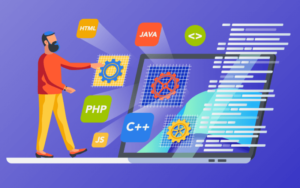Best Web Designing Course
Immerse yourself in a world of knowledge and skill-building as you embark on a transformative online journey. Dive into engaging lessons, interactive content, and expert guidance to unleash your full potential. Join us today and sculpt your future with the power of knowledge No prior knowledge of WordPress is required as everything will be covered in this course. You will need a working computer and a web browser connected to the internet. You don’t need any coding experience at all.
In this online course of Web Designing you will not only get to know about HTML and CSS but also how they will work in real time industrial environment. What all you can do with these technologies and how you can afferently use them. You will also learn how you can quickly make professional websites with these technologies.
With this course you will get all the required study materials along with tutorials how you can apply a particular thing. Finally you will get to learn to create A Responsive Custom Website.
No, most courses start from scratch. You don't need to know any coding to begin.
You'll likely use a combination of tools. This can include text editors for coding (like Visual Studio Code), design software (like Adobe Photoshop or Figma), and website builders (like Wix or WordPress).
The time it takes varies. Basic skills can be learned in a few months, but becoming a proficient web designer often takes a year or more of practice and learning.
You'll learn about HTML (structure), CSS (style), JavaScript (interactivity), user experience (UX) design, user interface (UI) design, responsive design (making websites look good on different devices), and potentially website management platforms like WordPress.
You can become a web designer, front-end developer, UI/UX designer, or work as a freelancer. There are also opportunities in digital marketing and e-commerce.
Yes, it can be a great career choice. There's a high demand for skilled web designers, and the field is constantly evolving, offering opportunities for growth and learning.
Salaries vary based on experience, location, and the type of job. However, web designers can earn competitive salaries.
Yes, you can learn online through tutorials, courses, and practice. However, structured courses often provide better guidance and support.
Web design focuses on the visual aspect of a website, while web development involves building the website's functionality and structure.
While a degree can be helpful, it's not always necessary. Many successful web designers have learned through self-study, bootcamps, or online courses.
Requirements
- Creativity: A knack for designing visually appealing and user-friendly websites.
- Attention to Detail: Meticulousness in coding and design.
- Design Basics: Understanding color theory, layout, and typography can enhance your website design skills.
- Curiosity and Learning Aptitude: A strong desire to learn new technologies and programming languages.
- Patience and Persistence: Web development can be challenging, and perseverance is key.
- Teamwork: Ability to collaborate with other developers and designers.
- Adaptability: The web development field is constantly evolving, so being open to learning new technologies and approaches is crucial.
Features
- Comprehensive Curriculum: A well-structured course should cover a wide range of topics, including HTML, CSS, JavaScript, UI/UX design principles, responsive design, and web development frameworks.
- Practical Projects: Hands-on experience is crucial. A good course will incorporate real-world projects to apply learned skills and build a portfolio.
- Industry-Relevant Content: The course should align with current web design trends and industry best practices.
- Experienced Instructors: Qualified instructors with practical experience in web design can provide valuable insights and guidance.
- Portfolio Building Support: Assistance in creating a professional portfolio is essential for showcasing skills to potential employers or clients.
- Career Guidance: A good course will offer career counseling, job placement assistance, or networking opportunities to help students succeed in the industry.
Target audiences
- Recent Graduates: Those with degrees in computer science, information technology, or related fields looking to specialize in web development.
- Career Changers: Individuals seeking to transition from other industries into the tech world.
- Entrepreneurs: Business owners or aspiring entrepreneurs wanting to build their own websites or online stores.
- Designers: Graphic designers or UI/UX designers looking to expand their skill set.
- High School Students: Young individuals interested in technology and exploring potential career paths.
- Freelancers: Those aiming to build a freelance career in web development.
- Marketers: Individuals in marketing roles who want to enhance their digital marketing skills.
- Hobbyists: People with a passion for coding and website creation as a personal interest.
- Small Business Owners: Business owners looking to manage their website in-house and save costs.
- Non-profit Organizations: Staff members seeking to develop or maintain their organization's website.


